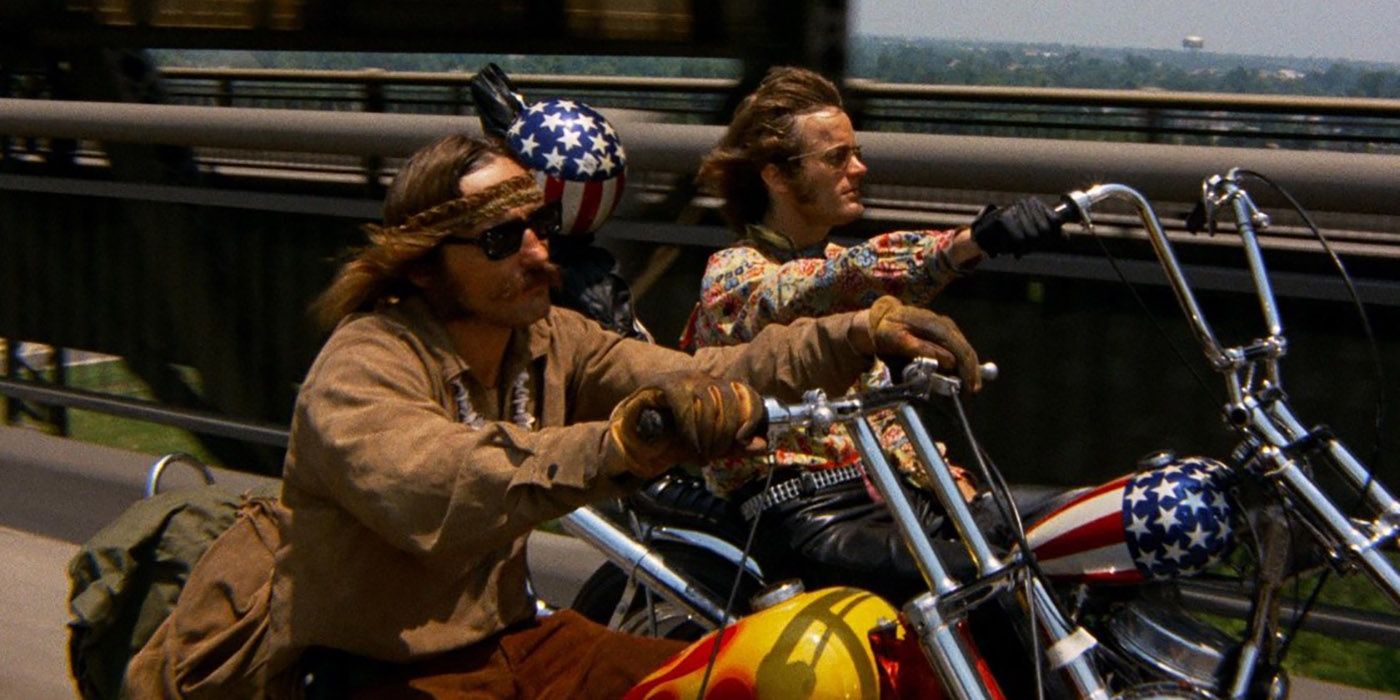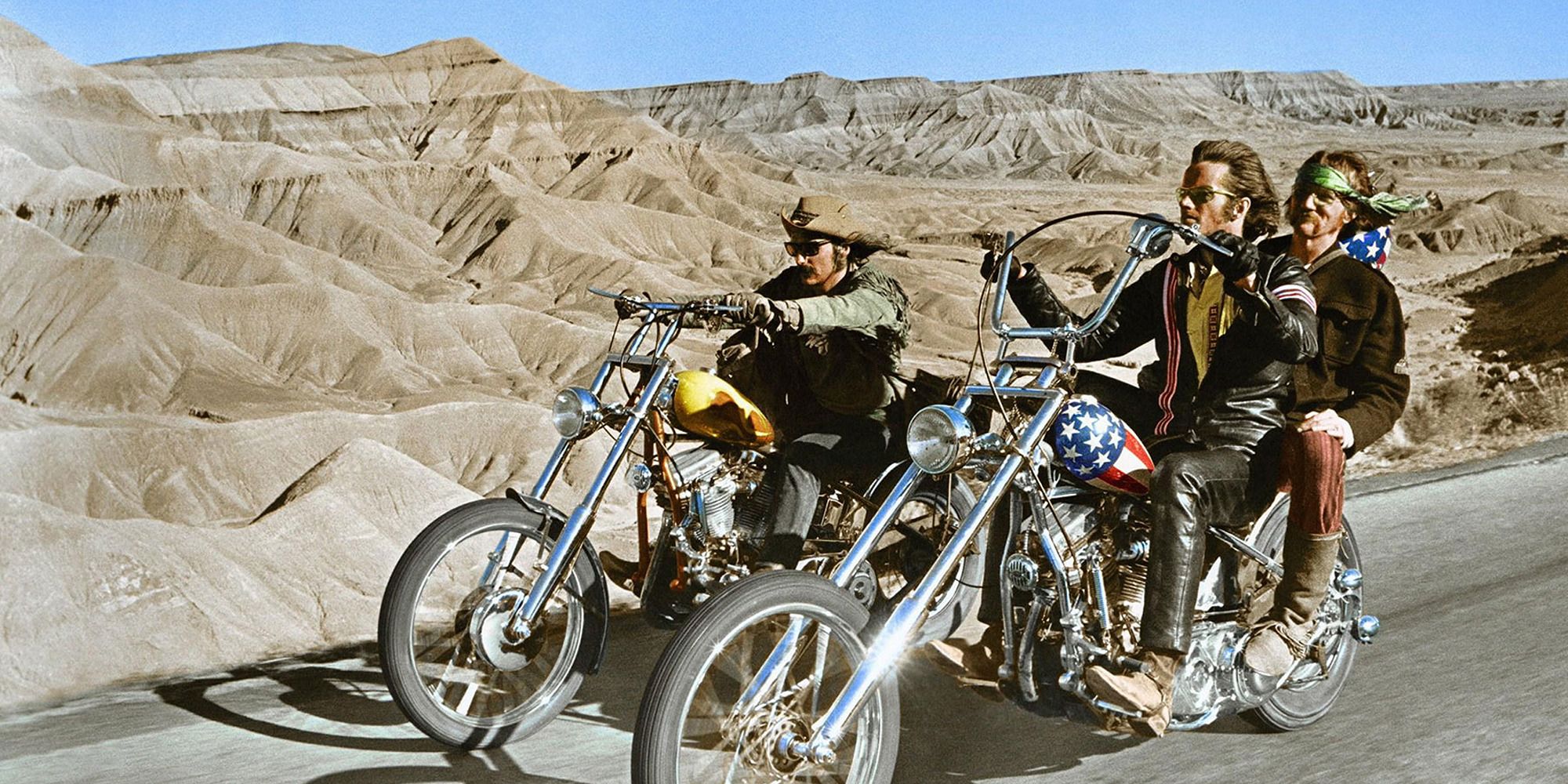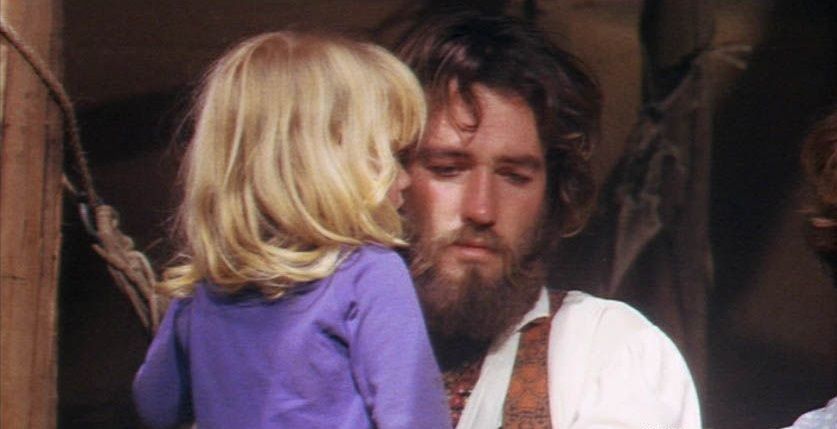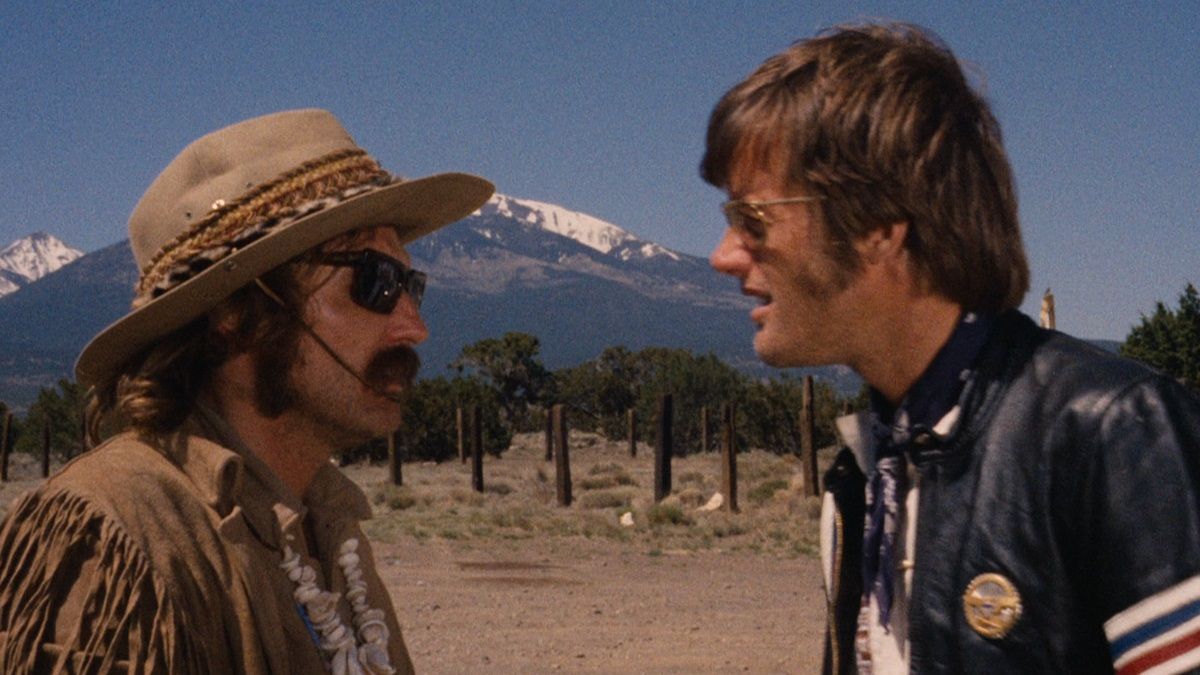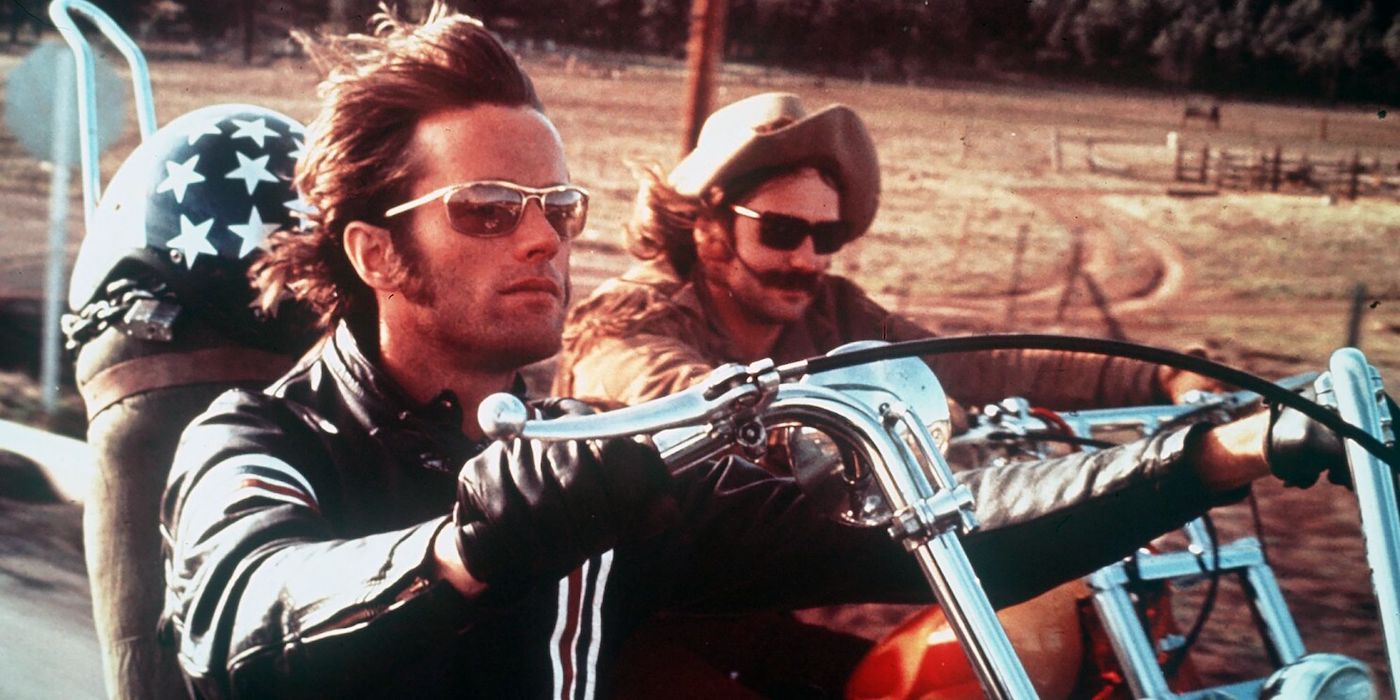There aren’t many films that encapsulate an era as perfectly as Easy Rider. It was released in 1969, the final year in one of the most important decades for American culture. It was a time of great social reform, with campaigns such as the civil rights movement and second-wave feminism finally achieving the legislative and cultural victories they had been searching for. The increasingly counterculture youth — spurred on by musicians like Bob Dylan and filmmakers like Arthur Penn — sought to upheave centuries-old notions they deemed unfit for a modernizing world, and with the charismatic John F. Kennedy leading the charge, it seemed they were going to get everything they wanted. But dreams are easier dreamt than realized, and the decade’s final years were besmudged by upheaval and unrest, brought on by an escalating war in Vietnam and the assassination of many of its great leaders. What started with the promise of a new golden age ended with a nation in turmoil, and as the sun set one last time on the decade that JFK had once dubbed as the “New Frontier," few mourned its passing.
It’s amidst this backdrop that we’re introduced to Wyatt (Peter Fonda) and Billy (Dennis Hopper), the freewheeling motorcyclists at the heart of Easy Rider. They spend their days riding through the American South on a pair of trusted Harley-Davidson choppers, oblivious to the troubles of the modern world. Our first encounter with them says it all. They’ve just finished smuggling cocaine from Mexico to Los Angeles and earned themselves a large sum of cash in the process. With their spirits high and their pockets loaded, they set off to the tune of Steppenwolf’s “Born to Be Wild," a song that so perfectly embodies their personalities it feels like it was written specifically for them. Their destination is the Mardi Gras festival in New Orleans. What they’ll do with themselves afterwards never crosses their minds, nor do they have much of a plan about getting there beyond driving east and hoping for the best. Wyatt and Billy are not people to think ahead — they’re outlaws who live for the moment, and what starts as a simple trek across 2,000 miles of untamed land becomes a platform with which to explore this crucial period of American history. Easy Rider captured the mood of its era so flawlessly that viewing it today feels akin to sifting through a time capsule from a bygone age — a result that makes it a fascinating film to return to.
Outsiders Who Were Born to Be Wild
The central part of Easy Rider’s appeal came from its outsider sensibilities, both in the way it was made and the film itself. For context, the 1960s was not a good decade for Hollywood, with studios beginning to realize that the ridged and producer-driven style that had served them so well in the past had little appeal to a more cynical and free-spirited audience that was quickly becoming their main demographic. Films like Bonnie and Clyde and The Graduate helped to kickstart the change that would result in New Hollywood (the dominant method of filmmaking in the 1970s, characterized by a more liberal use of taboo subjects and a greater emphasis on directors), but such seismic changes do not happen overnight. While this was occurring, Peter Fonda was gaining a reputation as a leading figure in the counterculture movement, thanks to his starring roles in various Roger Corman films like The Wild Angels and The Trip, just two of the innumerable low-budget films hoping to entice the audience that tentpole films had turned away. Their moderate success would prove influential when major studios began to make their own rebellious/psychedelic-infused movies, but accusations of inauthenticity leveled against the people behind them hindered their achievements.
It was here where Easy Rider excelled. While Fonda and Hopper (who served as producer and director, respectively, while also sharing screenwriting credit with Terry Southern) considered making their film in cooperation with Corman, one high-tempered meeting was all it took to convince them to take the independent route. As a result, the duo had almost total control over the project, a result that saw Hopper achieving the freedom his onscreen counterpart spends the whole film searching for.
'Easy Rider' Taps an Untapped Market
This didn’t translate to the smoothest of shoots — neither Fonda nor Hopper had worked on the crew of a film before, and it didn’t take long for that lack of experience to show. But it gave Easy Rider an authenticity that none of its competitors had. This wasn’t a group of commercially-oriented filmmakers trying to appropriate trends that didn’t belong to them, but a ragtag team of amateurs with nothing on their minds but a passion to tell a story they believed in. Bonnie and Clyde and The Graduate set the ball rolling, but when Easy Rider roared its way into theatres in the summer of ’69 on the back of a measly $400,000 budget and became one of the most profitable independent films ever made, it was clear Hollywood would never be the same again.
The absence of studio heads funneling every aspect of production through the filter of test screenings and box office viability gave Easy Rider a unique feel unlike anything audiences had previously experienced. Wyatt and Billy (and the actors playing them) ingest a liberal amount of marijuana on their journey east, but while other films would denounce such actions as immoral, here it’s barely commented on. Integral aspects of the hippie subculture like free love and a communal lifestyle are treated in the same way, and while it doesn’t outright promote this way of life, it doesn’t feel like that was Hopper’s intention anyway. Instead, he just wants to present a version of America that reflects reality, away from the sanitized version that Hollywood had become so fixated on. Easy Rider was among the first films to include such plot points without also feeling the need to become a public information lecture about why they were bad, with Hopper preferring to let his audience decide their own opinion on such matters — a radical move in an age where the lingering effects of the Production Code still haunted when Hollywood studios would and wouldn’t do.
Wyatt and Billy Are the Perfect Protagonists
But this approach would have been meaningless without Wyatt and Billy leading the charge. They’re the perfect protagonists for a film like this, and it’s hard to imagine anyone in 1969 not relating to their unflinching rejection of societal norms. Both are at their happiest when civilization is but a blip on the horizon, and the elongated scenes of them riding through the American outback with nothing but the wind in their hair and the sun on their backs presents a serene image that would enthrall anyone. But such a life is not a sustainable one, and their inevitable pit stops to a "decent" way of living are treated like getting an injection — an ordeal that must still be endured. The places they visit display an uncomfortable mix of conservative and progressive ideals, giving the impression of a country at the threshold of an intersection it’s only half committed to cross. Wyatt and Billy like these towns just as much as the towns like them, and even though they mean no harm as they pass through, society is keen to take its revenge.
It's during one such visit that they’re thrown in jail for “parading without a permit," reducing the bikers who live only for the open road to a pair of rats in a cage, beholden to the law they’ve tried so hard to escape. Tired from arguing with the guards, Wyatt uses his American flag jacket as a pillow, a quiet act of rebellion that’s just one of many that Hopper sneaks into his film. The ultimate symbol of freedom is now just as confined as the people it’s supposed to serve, a subtle jab that would have delighted a 1969 viewer. It’s in this scene that we’re introduced to George (Jack Nicholson), an ACLU lawyer who briefly joins them in their pursuit of liberty, speaking Easy Rider’s most defining words in the process: “They’re not scared of you. They’re scared of what you represent." Wyatt and Billy are not the kind of people to attach labels to themselves, and would probably reject their status as counterculture heroes if they caught a glimpse into the real world, but the truth is they’re part of something far greater. They’re at the heart of a culture war that’s still going strong today, and if there’s one thing that all forms of establishment can unite in hating, it’s change.
A New Style of Filmmaking
That sentiment extends to the innovative ways Easy Rider told its story. The invisible editing and precise cinematography that has defined Classic Hollywood was ill-fitting for a tale such as this, resulting in a style that feels closer to the fragmented approach taken by the French New Wave. Jump cuts, abrupt shifts in time, jerky camera movements that look like they were improvised on the spot — all things that Old Hollywood loathed and New Hollywood cherished, so there’s no point asking which side Easy Rider was on. They help to simulate the psychedelic haze most of Easy Rider’s characters spend their lives in, while also giving the film the appearance of a half-remembered dream that foretells the editing style of later New Hollywood visionaries like Terrence Malick and John Cassavetes. It can be off-putting, but that’s the point, and it’s telling that this hyperactive style simmers down considerably when Wyatt and Billy are cruising down the backroads of a country they love as opposed to the built-up streets of a country they hate. Such experimental techniques were unheard of in mainstream films at the time, and Easy Rider’s success helped to cement their place in the language of American cinema.
It was recently reported that a reboot of Easy Rider was in the works, confirming the age-old belief that Hollywood will not let any property die a peaceful death so long as it still has name recognition. Quite what this film will look like (assuming it even happens) remains unclear, but a quote from one of its producers talks about building upon the work left by the original, allowing them to “give the youth of today a film that pays serious attention to their own countercultures and challenges." The implication is that it will be more of a spiritual successor than a straightforward remake, swapping out the 1960s for a contemporary setting that still retains the renegade tone of Hopper’s film. That would be the sensible way of approaching this project, but cinema is a vastly different beast than it was 50 years ago.
Easy Rider was an utterly singular film that could only have been made in a very specific timeframe by a very specific group of people, and trying to recapture that lightning in a bottle feels like following the letter rather than the spirit of the law. Still, it’s nice to see that its reputation as the definitive youth-oriented film continues to hold strong, and for those who have never had the opportunity to experience its hallucinatory portrayal of 1960s America, it’s well worth a look.

